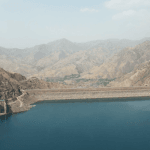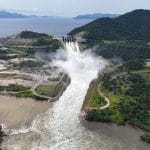In an effort to boost Greece’s decarbonization efforts and phase out the country’s polluting lignite plants, a group of companies formed by the largest energy groups in the country have submitted the national proposal for White Dragon, in the framework of the Greek call for expression of interest for Hydrogen Important Projects of Common European Interest.
“The White Dragon project indeed involves in the first line renewably produced hydrogen. The vast space of the lignite fields allows especially solar production,” Hydrogen Europe Secretary General Jorgo Chatzimarkakis told New Europe on May 28.
DEPA Commercial, as project coordinator, in collaboration with Advent Technologies, Copelouzos Group through Damco Energy, Public Power Corporation (PPC), DESFA, Hellenic Petroleum, Motor Oil, Corinth Pipeworks, Trans Adriatic Pipeline (TAP) and Terna Energy submitted on May 5 to the Greek Government and the European Union their investment proposal which exceeds the amount of €8 billion, for the development of an innovative integrated green hydrogen project in Greece which covers the entire hydrogen value chain.
Chatzimarkakis stressed that the role of the EU is indeed paramount as Greece is a newcomer in terms of hydrogen. “But it’s a very fast learner. However, without the overall framework given by the European commission in terms of building up the infrastructure but also incentivising the markets it would be very difficult,” he said.
White Dragon foresees the gradual replacement of the lignite power plants of West Macedonia and the transition to clean energy having as final goal the decarbonization of the Greece’s energy mix.
Asked if green hydrogen is enough to lead to the decarbonization of Northern Greece and phase out of the lignite plants, Chatzimarkakis told New Europe green hydrogen is important but it needs time to scale up. “We therefore might start with projects that encompass also low carbon hydrogen with different technologies,” the Hydrogen Europe Secretary General said.
The White Dragon is fully supported by the Region of West Macedonia and is the development of the initial expression of interest, in September 2019 in Brussels, of the of West Macedonia Regional Governor George Kasapidis, DEPA said in a press release. At regional level, it has also the support of the Bioeconomy and Environment Cluster of West Macedonia.
The White Dragon project will use large-scale renewable electricity (GW) for the production of green hydrogen by electrolysis in Western Macedonia.
Hydrogen will then be stored directly (short-term hydrogen storage) and indirectly (streaming through DESFA’s natural gas pipeline) and, subsequently, through high temperature fuel cells will provide the country’s power grid with electricity as a fixed base load co-generation unit of green energy and heat.
The generated heat, as a by-product of green electricity production, could initially have a complementary use to the district remote heating networks of West Macedonia, as well as in other applications that require heat and / or cooling in the future industries, data centers, greenhouses, etcetera.
Moreover, a main goal of the White Dragon project is the development, by the cooperating companies, of an integrated Hydrogen Industrial Research Center within the High Technology Hydrogen Node Research & Development & Innovation that will be created in West Macedonia.
The intended upgrade and capitalization of the existing energy infrastructure – electricity grids and natural gas pipelines – is of utmost importance, DEPA said. In particular, natural gas pipelines will be used for the transport of green hydrogen for other uses, as well as for its indirect storage.
A necessary condition is the creation of a regulatory framework for Energy Net Metering as a transition option until the full development of the hydrogen economy.
To accelerate growth in the framework of White Dragon, the National Natural Gas Transmission System will initially be prepared so that it can receive increasing rates of hydrogen, which will reduce the carbon footprint of the fuel and help initiate the hydrogen market. Moreover, the study and construction of an exclusive hydrogen backbone pipeline will be implemented in Greece, along with the first hydrogen projects in the transport sector (garbage trucks, trucks, trains, cars), the appropriate infrastructure for hydrogen refueling stations (HRS) and its road transportation and distribution.
According to DEPA, the exclusive hydrogen backbone pipeline will enable the interconnection between remote green hydrogen production units with large end consumers (refineries, industrial units, etc.) to help them “green” their production processes, but also the interconnection with the respective systems of neighboring countries. Finally, through the integrated White Dragon project, the transport and export potential of hydrogen through TAP Pipeline connecting Greece to European markets.
Chatzimarkakis explained that the TAP Pipeline is needed as a cheap possibility to transport renewably produced hydrogen for exports, first as blending and later on as pure hydrogen. “It’s an important factor for the whole project,” he said.
follow on twitter @energyinsider







